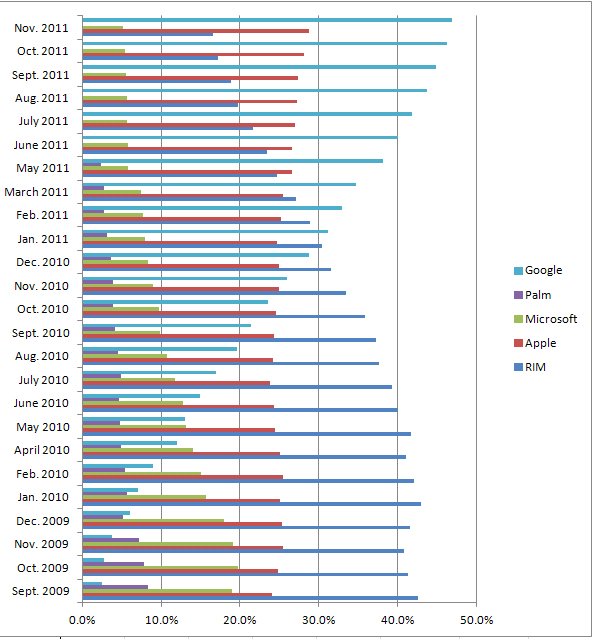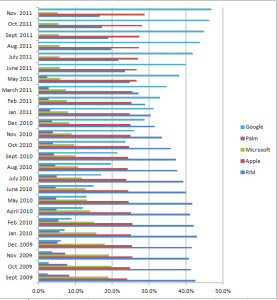2011’s Predictions Revisited – How Wrong was I?

At this time of year, it is traditionally that people write their predictions for the year coming up. They usually make a series of bold claims that subsequently start to look ridiculous or they make a series of claims that are so mind numbingly obvious that everyone gets bored after a couple of seconds. Of course the next year nobody bothers to check on their predictions to see whether they were wildly off or particularly astute. Given that I did the wild predictions last year, lets revisit those claims and see how stupid I really was.
1. The Fall of Google
Ah.
This is going well already, isn’t it?
So Google didn’t fall last year at all, in fact, it went from strength to strength. It is still the number one visited website according to anyone that matters (Alexa, Compete, Comscore, etc).
But it hasn’t all been going Google’s way. Why did I think that it would be their downfall last year? The reason I thought was spam. Particularly I was looking at spam that was ‘user generated content’ within affiliate websites. Sites which offered ‘reviews’ to give value add, which were becoming increasingly nonsense and no use to the user at all. I thought that users would soon start switching off because of this.
However what I didn’t foresee was Google making some major updates to the way that the algorithm worked:
- Google Panda was an algorithm update in February. One of the main differences was that newer content hit the top of the rankings sooner and pushed older content further down the rankings. It also seemed to adversely affect affiliate websites and websites that do scraping of content. It also reduces the impact of mass produced pages.
- Google Plus and Plus one is the start of a major change to the way Google creates its personal algorithm. Individual users are going to have their own personal algorithm based on what their contacts have been doing.
- Google changed the default search to secure. This will mean that they can transition those who have Google accounts to use their personalised data for search. Particularly this will impact those who are using Gmail, Google Plus and other systems that frequently run in the background.
- More Personalised Paid Search. Whilst all the organic updates were going on, one big change that was often missed was the move towards personalised paid search. This was always the fall back of those sites with poor reputations, but it may not continue in that way as users push down the paid search ads from undesired websites.
2. The Death of Online Newspapers
Erm…
Yes…
I’m going well so far.
So it turns out it wasn’t the death of online newspapers. The MailOnline hit 80m unique browsers in a month in November 2011. This is up 73% on the previous year. The Guardian was up 59% and the Independent was up 36%. So how did they do it?
Well the Mail decided that rather than being niche it was going to go as mainstream as it possibly could. 55% of their unique browsers now come from outside the UK, although 67% of their page impressions come from inside the UK suggesting that they are attracting a lot of people who are just floating past (probably through search). This is a pattern that is matched at the Guardian.
So maybe some more newspapers have gone behind a subscription model? Well if anything it has gone the other way around. The News of the World was News International’s attempt to see if it could make a tabloid work behind a subscription model after moving the Times there. Unfortunately that experiment went by the wayside as they were forced to close amid a huge hacking scandal that hasn’t quite reached its zenith yet. It remains to be seen whether the Sunday Sun will follow the same route when it arrives.
3. The Mobile Web’s applications find wider use
I’m on safer footing with this one at least. This was an important year in mobile application building for one big reason. The big reason is that Adobe decided that they weren’t going to update their Flash for mobile browsers. This doesn’t sound like a particularly exciting move to the average bystander, but it has far reaching implications.
Firstly this is an admission by Adobe that they’ll never get Apple to have Flash in Safari on the iPhone, therefore missing out on one of the biggest markets in mobile. Notably they are going to continue to help developers with Flash on applications.
Secondly they are going to start helping developers work towards developing for HTML5, which is standards compliant. This means that as mobile browsers get more sophisticated they will be starting to show what is on the actual web page, rather than developers having to code for different devices.
It’s an interesting move because the shift in the mobile world is a significant one at the moment. The growth in the Mobile market over the last twelve months has been to Android:
 |
| Data from Comscore via fiercemobilecontent |
Android of course being open source means that you can develop any applications you like for it and do whatever you want with it, including creating new browsers. My current browser of choice on the mobile is Dolphin.
4. The boom of use of Analytics tools
Last year at this time I said that there were 94 jobs in the UK for Web Analytics on Total Jobs. This year there are 119. Is that evidence of an increase in use of Analytics over the last year?
There was a continuation of the acquisitions, most notably as Adobe started buying companies that not only had technology, but also did consultancy. Google also introduced a ‘Premium‘ version of the tool, which you can pay for to get support.
Who knows what will happen, but the industry is facing a major crisis in the coming year. As the rest of the world watches, Europe is introducing new regulations on cookies as the US watches on. If the US follows the EU example then it could well spell the end of Web Analytics as we know it. If the EU experiment fails then we’re likely to find hundreds of US websites flooding the area that the EU companies lose competitiveness in.
Certainly it is an interesting time to be part of the industry! It’s make or break time.

Leave a Reply